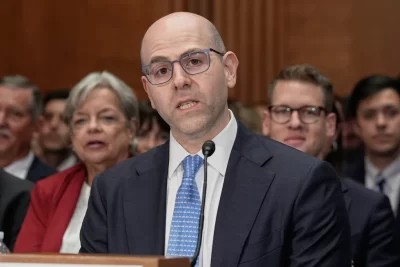
Few corners of the U.S. may be less hospitable to Donald Trump than California, where he lost by more than 5 million votes in the 2020 election. But as the former president seeks to return to the White House, the liberal bastion may give him an unlikely boost.
A state GOP rule change has opened the possibility that Trump could sweep each of the state’s 169 delegates on March 5, when California is among more than a dozen states participating in the so-called Super Tuesday contests. With Trump already leading his rivals in many state and national polls, a dominant performance in California could move him much closer to the GOP nomination.
“This race is quickly consolidating,” said GOP fundraiser Charles Moran, a Trump delegate in 2016 and 2020. With a win in California, he added, “I truly think Trump could take the nomination on Super Tuesday — then this is over.”
With less than four months before the Iowa caucuses officially kick off the GOP nomination process, the dynamics of the race could still change. But Trump is keeping a close eye on the state, where his most prominent Republican rivals will gather without him on Wednesday for the second presidential debate. While Trump is skipping the event, he has made sure to be in California on Friday to appear at the state’s GOP convention, where many of the people who will ultimately serve as delegates will be in attendance.
In what would be an ironic twist, the state where the former president is widely loathed outside his conservative base could help him tighten his grip on the Republican White House nomination.
California was home to the so-called Trump resistance during his time in office, and Trump often depicts California as representing all he sees wrong in America. As president, he called the homeless crises in Los Angeles, San Francisco and other big cities disgraceful, and threatened to intercede — faulting the “liberal establishment” for what he described as a “terrible situation.”
He berated state Democrats who supported funding health care for some adults who entered the U.S. illegally, and challenged California’s authority to reduce car emissions. Then-state Attorney General Xavier Becerra filed more than 50 lawsuits against the Trump administration, targeting initiatives on immigration, health care and the environment.
Still, the Trump National Golf Club Los Angeles sits on the Pacific coast south of the city. And even in losing California in a landslide in 2020, Trump received over 6 million votes — more than any Republican presidential candidate before him — with his margins topping 70% in some rural counties that typically favor conservative candidates.
California probably will be an afterthought in November 2024 — the state’s lopsided electorate makes it a virtual lock for Democrats on Election Day. You’d have to go back to 2000 to find a Republican nominee pushing hard to win California, when George W. Bush invested millions in the state then lost to Democrat Al Gore by 12 points.
Under the rule change, a Republican presidential candidate who pulls in more than 50% of the primary vote would be awarded all 169 delegates. If no candidate hits that threshold, delegates will be awarded proportionally.
Such a winner-take-all rule didn’t exist in recent presidential elections in the state. Previously, the California GOP primary amounted to dozens of separate races on a single day — one in each congressional district across the sprawling state, and then one statewide. The winner in each district collected three delegates; the candidate who
who received the largest number of votes statewide claimed a bonus of about a dozen more.




